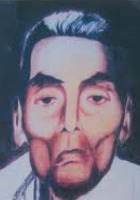Ananda Chandra Barua
Ananda Chandra Barua Poems
Yes, it was I, I remember now
Who had drunk the fragrant wine of persia
With unquenched thirst
and with purling music had enticed my heart.
...
Ananda Chandra Barua Biography
Ananda Chandra Barua was born on December 31, 1907, at Khumtai Tea Estate, in upper Assam. His father was Late Premadhar Barua and mother Late Indrani Devi. They had eight children, of which Ananda Chandra was the fourth. He is popularly known as Bokul Bonor Kobi. Ananda started his schooling at Dhekiakhowa and showed keen interest in his studies. He had also received several scholarships in the primary stage till he went to study in the Government Boys’ High School at Jorhat. When he was a student of Class VI, the seeds of literature germinated in the mind of young Ananda Chandra. He began to contribute his writings to the hand written school magazine called Jeuti. It was at the high school that he came into contact with the great poet Papori Kobi Ganesh Gogoi. The friendship between these two great poets left an indelible mark on Assamese literature. Ananda Chandra Barua passed his matriculation in 1926 and later went to study at the Benaras Hindu University. Although he studied there for nearly three years, Ananda Chandra Barua could not acquire a degree for reasons not known certainly. But it was in Benaras that he accomplished certain knowledge and experiences much more valuable than a degree. During those days all the students from Assam who were studying at the Benaras Hindu University brought a hand written journal Jahnavi. It was in this periodical that Ananda Chandra Barua contributed generously with his literary pen. Ananda Chandra Barua had initially started his career as a journalist. He first served as an editor in a newspaper called Asomiya, which was published from Guwahati by Chandra Kumar Agarwala. After successful publication of the newspaper for nearly two years Ananda Chandra Barua decided to return to Jorhat. He then joined the School Inspector Office at Jorhat in 1932 and served there temporarily for a year. The next year he joined Senarian High School at Tinsukia as an Assistant Teacher. But in 1934 he once again returned to Jorhat to resume his career as a journalist. He joined as a sub-editor in Shiva Prasad Barua’s weekly Batori, on a salary of Rs 100, a month. The editor of this popular weekly was Bagmibor Late Nilomoni Phukan. It is worth mentioning that it was through this newspaper that Ananda Chandra Barua first titled Nilmoni Phukan as “Bagmibor” and Jyoti Prasad Agarwala as “Rupkunwar”. Then he became a school teacher in the Dikom Tea Estate in the year 1942. A year later while the Second World War was going on, he left home for Karachi to join the Indian Air Force. In 1947 he eventually returned to Jorhat and finally joined his last job at the Industrial Training Institute as an accountant and served there faithfully till the time of his retirement on December 31, 1968. Ananda Chandra Barua wrote many poetry, drama, translation, prose, novels besides contributing to various periodicals. From 1930 to 1982, nineteen books were published by him. Some of the books written by him include Porag (1930), a collection of poems; Bijoya (1932), a drama; Hafizor Sur (1933) translation of poems; Bisorjan (1933) a drama; Ranjan Rashmi (1934), a collection of poems; Puspak (1934) sonnets; Nal Damayanty (1934) drama; Meghdoot Purbamegh (1940), translated poems; Komota Kuwori (1940), a drama; Asiar Jyoti (1960), translation work; Soviet Kabita (1968) translated poems; Kumar Sambhav (1969), translated poems; Paporir Porimal (1969), collection of poems; Bokul Bonor Kabita (1976), a collection of poems; Sei Nimati Puware Pora (1982), a collection of poems; Kopoi Kuwari (Children drama); Nilanjan, drama; Pondit Modon Mohan Malaviyar Jiboni, biography and Ethan From (translations). Some of his unpublished but completed works are Panchami, children drama; Tejimola, children drama; Phulora, children’s one-act-play; Sahjahanor Ontim, translated play; Bonik Bondhu, translated play; Sitaharan, drama; Mrigamaya, drama and Banipath, for school curriculum. Agnigarh (drama); Asomiya Deka (novel) and Amar Sahitya (for public education) are some of his incomplete and unpublished works. He had acted in quite a number of plays and a few films. He played pivotal role in dramas like Sahjahan and Chanakya; as the character of Laksman in Mitradev Mahanta’s Boidehi Biyug; as Sokuni in Ganesh Gogoi’s Sokunir Pratisudh; as the old maulovi in Phani Sharma’s Siraj and in many other important roles. In Padum Baruah’s film Ganga Silonir Pakhi he won the hearts of the audiences with his stunning performance. Ananda Chandra Barua was also an integral part of the Jorhat Theatre. He had not only acted in several plays but also staged many plays. He won the prestigious Sahitya Academy Award in 1977 for his book Bokul Bonor Kabita (1976). Ananda Chandra Barua received the title ‘Padmashree’ from the Government of India on April 21, 1970. Ananda Chandra Barua died at the age of 76 years in the year of 1983.)
The Best Poem Of Ananda Chandra Barua
Hafiz And I
Yes, it was I, I remember now
Who had drunk the fragrant wine of persia
With unquenched thirst
and with purling music had enticed my heart.
I was Khayyam and Hafiz, with flowing beard
And dozing eyes
Face clouded with dreams and riddles
Mind impassioned in eager love
Mellow on the pink grape wine
Overflowing the cask
I saw on leaves and trees and grass and sedge
But the passing of a moment of love
In the contours of Anarkali I saw
A deep sea of mystery
As if the wishes of the unseen one
Were but a strain of my love’s melody.
As if it was I who had served
The ease of poesy
Mixing wine with the Shirazi garden.
[ Translated by Pradip Acharya ]
